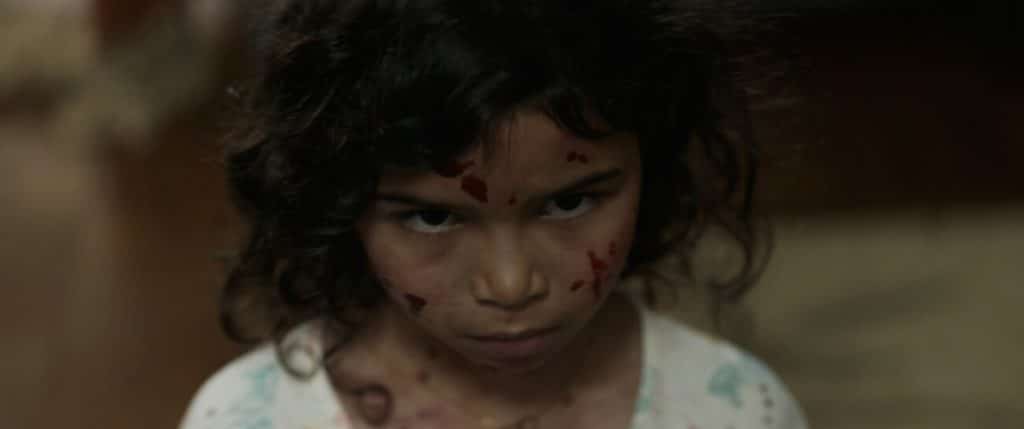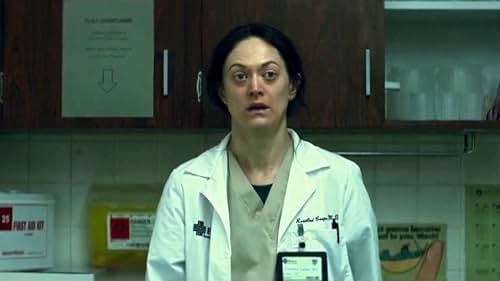
Wherever we go when we die – if we go anywhere at all – it seems to be an increasingly anonymous, formless kind of a place, if horror is anything to go by. Those strict old religious ideas about Heaven, Hell, and even Limbo and Purgatory seem to have muddied. Now, if you go ‘over there’ and come back, it seems you’re coming back from a mysterious, if malign somewhere (Talk To Me, I’m thinking about you here, but only because I saw the film recently: see also Pet Sematary, Flatliners, Return of the Living Dead III, Wake Wood, all of which play with the same ideas.) I’d made the assumption that Birth/Rebirth would be something along the same lines; the much-shared image above suggests it is; and in some respects, it is, but aside from a few significant, upsetting and grisly moments, its own riff on the idea of coming back from death is rather quieter. It’s a film about the ramifications of life after death for the living, and it often draws its horror from its ethical questions, rather than extraordinary (in terms of supernatural) plot points.
With a few echoes of Inside (2007), a serious injury or illness opens Birth/Rebirth; it’s an arresting start, capturing the blurry chaos of a medical emergency from the perspective of the sufferer. It transpires that this crash team are desperately trying to save the life of an unborn baby as well as its mother, but the unsettling ‘lights out’ sequence that follows makes it clear that only one person makes it. The juxtaposition of new life with an ensuing autopsy is one of the film’s most unpleasant moments; everything here, from the demeanour of the staff overseeing each procedure to the at-times nightmarish lighting, reminds us that life is a delicate balance.
This life/death dichotomy extends out of the hospital as we follow our life-preserving obstetrician Celie (Judy Reyes), leaving work to pick up her little girl, Lila (A. J. Lister). Meanwhile the pathologist, Rose (Marin Ireland) seems to be a strained and troubled woman – a bit of a stereotype which I’m sure any watching pathologists will just love, horror film or not. She treats people, living or dead, like an assemblage of body parts and functions (a little implausibly, in one early scene; the interplay between human biology and human behaviour as explored in the film can be hard to accept.) Before very long, this neat division between life and death, as encapsulated apiece by Celie and Rose, begins to blend. Lila falls ill; Celie leaves her with a neighbour that morning, but underestimates the extent of her illness, which turns out to be devastating bacterial meningitis. As she is at work, and as she damages her phone when she’s there, she knows nothing about her daughter until it is too late.
Step forward Rose, who – for the first time yet – takes a warm interest in her newest specimen. Is it her humanity, finding an outlet? Or something more? It’s at this point that things move from being broadly, plausibly horrendous with a dash of hideous, to more what we could class as a low-key science fiction film. It’s also here that the film is at its most strained, plot wise; it’s funny, as a horror fan, that supernatural explanations often get a pass whilst science-leaning stories get more scrutiny; I guess what Mary Shelley could get away with doesn’t fly today, now that we have ever increasing understanding of how bodies actually work. But anyway: we are told that Rose has been working on an experimental serum which could, and has, reversed physical death. She’s interested in Lila as a means to advance her experiments to the next step, a fact which soon draws in Lila’s bewildered mother, who discovers her daughter under Rose’s care, seemingly – alive.
There are plenty of commendable, engrossing aspects to Birth/Rebirth and actually, a lot of its best moments come early. The film’s ability to relay just how quickly a normal day can go indelibly wrong is excellent. A few subtle reveals, a few throwaway lines, and then – bam – everything is changed forever. Perhaps it’s because it starts so bloodily, but the film really has a queasy, nervous sort of feel to it, right from the opening scenes. Segueing into a ‘Bad Science’ vibe strains the film to its utmost as it asks and ignores a lot of questions and it almost breaks into pieces as it shifts from one mode to another but, if you can weather the storm, it does work pretty well as an ethics-based horror, taking an extraordinary circumstance, sodden with grief and unpalatable choices, and forcing us to see it through. Lila’s condition almost isn’t the point; it’s the sadness and desperation of her loving mother which is our focus. If Lila has seen anything, remembers anything, remains opaque.
Are there issues here? Yes, absolutely – a few. There are some hard lulls in the narrative (if a film finds the time to show its characters moseying around rooms picking things up and putting them down again, that’s usually a lull, and it usually suggests unnecessarily padding the runtime.) But perhaps the biggest question mark hangs over Rose as a character. Not only is she the source of most of the unanswered questions here, but she’s also the source of some uncomfortably dark moments of humour which are an ill fit overall; whilst Marin Ireland gives to the part what I’m sure she was meant to give to the part, flashes of almost-funny bits only underline the slightly clumsy aspects of Rose’s characterisation. She’s essentially Saga Norén from The Bridge, ripped up and re-potted in a path lab instead of a police station. Some of the scenes are even mirror images from the TV series, but these sit a little uneasily with the horror subject matter, which is a step darker and more demanding than even a police procedural. There’s also a bit of a question hovering over some of the uses made of female biology, which doesn’t usually work on command like that, and, by the by, the film is certainly not going to help reverse the current population crash.
That all being said, Birth/Rebirth is still very much worth a look. It’s a well made, often bold film which dares to do something quite unusual with its subject matter, even whilst still leaving us with the more established idea that death should remain a one-way destination. Most of the true horror here stems from people who disagree with that verdict, and whose grief or grief-defying curiosity urges them to challenge it. As such, it’s in its moral questions that the film really thrives.
Birth/Rebirth, a Shudder Original, is now available to stream on the platform.
